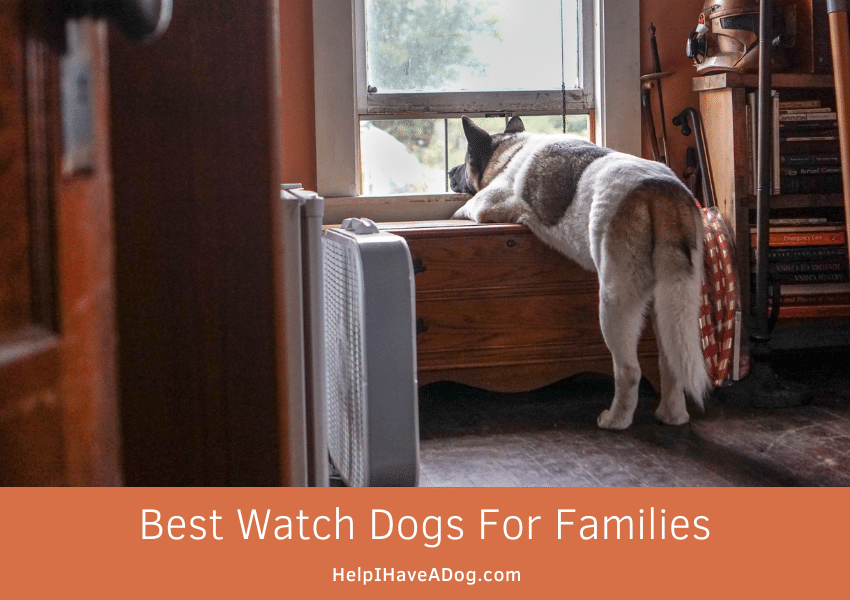By J. E. Davidson
A watch dog’s purpose is to alert the family that a stranger is approaching or that something unusual is happening. As opposed to guard dogs or protection dogs, a watch dog is not trained to act aggressively toward an intruder, although he may choose to do so on his own if he feels the situation calls for action.
When choosing a watch dog for your family, carefully research the individual breeds to find the best fit for your family. Watch dogs don’t need to be huge and intimidating; they only need to be willing to bark when necessary! Almost any dog who is loved and treated well by his family will have the instinct to protect his “pack” family and alert them when something is amiss.
The dog that is the best fit for your family may not be on this list. The dogs in this list were chosen for their protective instincts, intelligence, and affection for people. Realize that while a breed may generally possess certain characteristics, there may be individual variations within the breed.
The Best Watch Dogs For Families With Children
German Shepherd
This breed has a reputation for being a mean, aggressive killer, and their intimidating reputation will make an intruder think twice about entering your home. German Shepherds are excellent watch dogs for families with children. The breed is alert and intelligent, and when properly socialized and raised around children they can be quite fond and protective of them.
Chow Chow
Chows are often “one-person” dogs, but if raised around children and other household pets from an early age they can get along with them quite well. Reputable breeders are breeding Chows with less aggressive tendencies than in the past, resulting in well-mannered dogs with strong protective instincts. They can have willful and stubborn personalities, but early obedience training can make Chows a great family pet.
Great Dane
The Great Dane’s sheer size will intimidate intruders, but they are truly one of the gentlest, most affectionate dog breeds. They are seldom aggressive unless the situation calls for it, but will bark when necessary. They are patient and playful with children, but need early obedience training so the owner will be able to control this giant dog when it is full grown! Their huge size makes them a better choice for families with older children.
Boxer
Boxers are clownish, playful dogs who love people and are fond of children. They seem to have the ability to know whether a visitor is welcome or is an intruder. Their high spirits and rowdy play make them great pets for families with older children who won’t be knocked down as easily!
American Pit Bull Terrier
Pit bulls have an undeserved reputation as mean, vicious dogs due to their popular use among heartless dog owners as fighting dogs. Their breeding does give them a natural tendency toward aggressive behavior, but when raised with a loving, responsible family they are not a threat to people or other pets. A properly socialized pit bull can be a courageous, loyal and affectionate family pet when he has obedience training from an early age. Buy a pit bull from a reputable breeder, who breeds for even temperament as well as physical appearance.
English Bulldog
Although these dogs are small in stature, they have an intimidating appearance. Bulldogs are persistent and often strong-willed, but are gentle and affectionate with children. They will be determined to chase away unwelcome visitors, and who will argue with a dog who is brave enough to bait bulls?
Collie
Highly intelligent, friendly, and energetic dogs, Collies are gentle with children and protective of their families. They are inclined to be highly vocal when strangers approach, although they are seldom aggressive. Collies are a herding dog breed, and may tend to nip playfully at your children;s heels when playing with them. Maybe they;ll even herd the kids into their bedroom for you when they misbehave!
Irish Setter
These elegant, good-humored dogs will bark at strangers but seldom act aggressively toward them. They love adults and children, and will get along well with other pets. Irish Setters enjoy rough play and may not be suitable for families with very young children. They need lots of exercise to use up their excess energy, and do best in a home with a large yard or woods to run in.
Airedale
This largest of the terrier breeds looks intimidating, and his strong protective instincts often make him wary of strangers, but he is a devoted and loving companion to his family. Airedales are exceptionally intelligent, and learn new tricks easily, making them great fun for kids to teach. They are also one of the healthiest breeds, with few inherited genetic conditions.
Chihuahua
Often called the little dog with a big bark, the chihuahua’s vigorous barking will be sure to let you know when someone’s at the door! Chihuahuas need to be well-socialized so they don’t become snappish, since they are very distrustful of strangers. They will also snap at teasing children in self-defense, so this dog is best in a home with older children who will treat their dog well.
Before You Choose Your Dog
Responsible pet owners understand that when they bring a dog into their home, it is a commitment for the lifetime of the dog. Too many dogs end up in shelters with “behavior problems” when the real problem is that the owner didn’t take time to properly socialize and train his dog.
Begin early obedience training with your dog, and treat your dog as a member of the family. You don’t chain your children in the yard for hours on end (at least, I hope not) so don’t treat your dog that way either. Dogs who are kept close to their families will have stronger protective instincts.
The children in the home should not be allowed to tease the dog or you’ll end up with a dog who is distrustful of children. Although dogs often nip while playing, encouraging this sort of behavior can result in a dog who bites in self-defense. Always supervise your dog and children when they are together. Protect smaller dogs from rough play, and remember that even the gentlest dog may accidentally harm your child in play.
Teach your dog that biting is unacceptable behavior; his instincts will take over if protective measures call for it. Consider the temperaments of your children, and whether they are capable of treating a dog with respect. In some cases, the children are the ones who could use obedience training!

